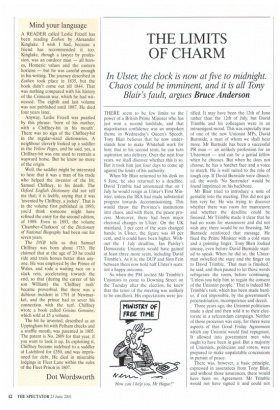Mind your language
A READER called Leslie Frizell has been reading Eothen by Alexander Kinglake. I wish I had, because a friend has recommended it too. Kinglake, though a lawyer by profession, was an outdoor man — all horses, Homeric values and the eastern horizon — but he was careful enough in his writing. The journey described in Eothen took place in 1835, but the book didn't come out till 1844. That was nothing compared with his history of the Crimean war, which he had witnessed. The eighth and last volume was not published until 1887. He died four years later.
Anyway, Leslie Frizell was puzzled by this phrase: 'born of his mother, with a Chiffney-bit in his mouth'. There was no sign of the Chiffney-bit in the regular-sized dictionaries. A neighbour cleverly looked up a saddler in the Yellow Pages, and he said, yes, a Chiffney-bit was one used to restrain a wayward horse. But he knew no more of the origin.
Well, the saddler might be interested to hear that it was a man of his trade who helped the inventor of the bit, Samuel Chiffney, to his death. The Word English Dictionary did not tell me that; it is feeble, saying that it was 'invented by Chiffney, a jockey'. That is in the volume first published in 1893; you'd think someone might have refined the entry for the second edition, of 1989. Even in 1893, the volume 'Chamber–Clarkson' of the Dictionary of National Biography had been out for seven years.
The DNB tells us that Samuel Chiffney was born about 1753, He claimed that at the age of 20 he could ride and train horses better than anyone. He was employed by the Prince of Wales, and rode a waiting race on a slack rein, accelerating towards the end, so that (during the career of his son William) the `Chiffney rush' became proverbial. But there was a dubious incident in 1791 at Newmarket, and the prince had to sever his connection with the turf. Chiffney wrote a book called Genius Genuine, which sold at £5 a volume.
The bit he invented, described as an Uppingham bit with Pelham cheeks and a snaffle mouth, was patented in 1805. The patent is No. 2809 for that year, if you want to look it up. In exploiting it, Chiffney became indebted to a saddler at Latchford for £350, and was imprisoned for debt. He died in miserable lodgings in Fleet Lane within the rules of the Fleet Prison in 1807.
Dot Wordsworth


































































 Previous page
Previous page